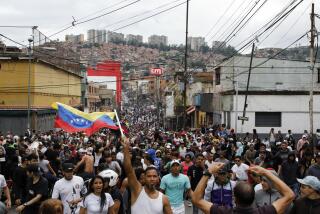Gorbachev Links Party’s Vote Losses to Food Shortages
- Share via
MOSCOW — President Mikhail S. Gorbachev, analyzing the Communist Party’s widespread and unexpected losses in this week’s parliamentary elections, has linked the setback to deepening anger over severe food shortages.
“The food problem is the fundamental problem at present,” Gorbachev said in comments published Friday. “If we solve it, there will be a colossal victory, not only in the economy but also in the political and social spheres.
“But if we fail to solve this problem, frankly speaking, we can ruin the whole of perestroika and bring about serious destabilization of society.”
He said that “if party and government bodies or individual leaders were severely criticized (during the election campaign), then it was because people perceived perestroika as going too slowly.”
‘Not a Tragedy’
Although perhaps a quarter of the party’s official candidates were defeated--in some cases, where they were running unopposed, a majority simply scratched their names off the ballot--this was “quite normal, part of the democratic process, and should not be blown into a tragedy,” Gorbachev said.
Perestroika itself, he said, had received “a powerful boost” with the election of so many reformers to the newly strengthened Parliament.
“People understand that for life to get better, time and work are needed with an improvement in performance,” Gorbachev said. “But they also do not like to put up with inattentiveness, mismanagement and attempts to preserve unapproachable bureaucratic offices like fortresses. Those who engaged only slowly in perestroika and were not expanding ties with the workers were the ones who lost.”
Gorbachev’s comments, which appeared Friday in the Communist Party newspaper Pravda, were made Wednesday to senior Soviet editors summoned to the party’s Central Committee headquarters for a review of last Sunday’s elections. Gorbachev also discussed the party’s new agricultural policy, adopted in mid-March with the aim of boosting harvests by decentralizing farm management.
The elections, he said, constituted an overall popular endorsement of perestroika , the program of political, economic and social reforms undertaken four years ago, and a mandate for its expansion and acceleration.
“The election campaign and the elections themselves have propelled us forward,” he said. “The people have had a taste of their own power. . . .”
But even before the election campaign, he said, the whole political situation had become “very difficult and contradictory,” and this was reflected in the results.
Ranking Officials Defeated
Many of the party candidates who were defeated were ranking regional officials, local mayors, top military and naval commanders--even an alternate member of the ruling Politburo.
“The elections showed that people within a developing democratic process will judge their leaders at all levels by concrete deeds, by how they act and by their political positions,” Gorbachev said.
Nonetheless, he sought to calm the anxiety within the party. There will be no across-the-board purge of losers, he said. But those who failed to win election should consider how they stood with the people, how they had lost contact with the people and the impact of this on their work in the party.
Yuri F. Solovev, the regional party first secretary in Leningrad and the highest ranking party candidate--as an alternate member of the party Politburo--to have been defeated, said Friday that both he and the party would survive the election and its aftermath.
“One should not overdramatize the situation,” he said.
Although he was the regional first secretary, he was not the entire party organization, Solovev told the official news agency Tass, and the prestige of the party had grown because of its willingness to face criticism for past mistakes and to accept the responsibility for them.
Tass said that although Solovev was unopposed, more people crossed his name off their ballots than accepted his candidacy--133,000 votes against him and 109,000 for him.
“One should be realistic and try to draw correct conclusions from the present situation,” he said. “The results of the voting show that many people are not satisfied with the course of perestroika in Leningrad. This means this process must be accelerated, corrections made and shortcomings rectified. A great deal of hard work is ahead.”
275 Seats Undecided
As a result of the numerous defeats of party candidates, 275 of the 1,500 seats remain undecided. In about a third of those districts, where no one in a field of three or more candidates won half of the votes cast, runoff elections between the top two vote getters will be held this month. In the other two-thirds--districts where voters rejected an unopposed candidate or a pair of rivals--fresh elections, with new candidates, will be held next month.
Gorbachev said the new elections will delay until late May the first session of the Congress of People’s Deputies, which has 2,250 seats and will elect the new Supreme Soviet, the country’s principal legislative body.
He also affirmed his intention to adhere to his present course, reinforced by the election results.
“We must go further on this path and not search for other roads or paths and not engage ourselves in political speculation,” he said, implicitly rejecting calls by Boris N. Yeltsin, the maverick Communist Party politician who won an overwhelming victory--89% of the vote--as an anti-Establishment candidate in Moscow.
Gorbachev repeatedly denounced suggestions for consideration of a multi-party system. Democracy, he said, “is not defined by the number of parties but by the role played by people in society.”
More to Read
Sign up for Essential California
The most important California stories and recommendations in your inbox every morning.
You may occasionally receive promotional content from the Los Angeles Times.










